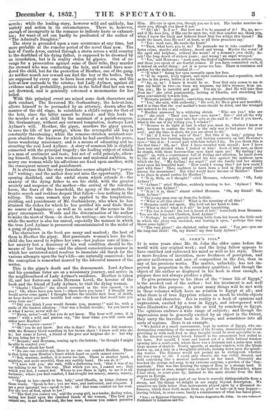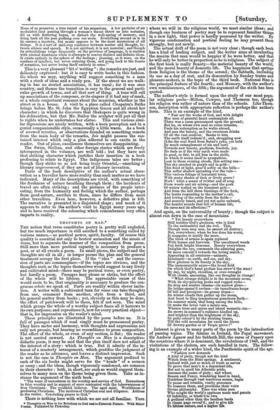ST. .701IN'S ISIS. * IT is some years since Mr. St.
John the older came before the world with any original work ; and the lying fallow appears to have enriched and enlivened his mind as well as his style. There is more freedom of invention, more freshness of perception, and greater mellowness and ease of composition in the Ins, than in any of his previous works. The matter, unluckily, has not im- proved in proportion to the secondary qualities ; and though the object of the author as displayed in his book is clear enough, a purpose does not always produce a plan. To give permanence to his ideas of the "inner life of Egypt," is the avowed end of the author : but his treatment is not well adapted to this purpose. A great many things will be met with in these volumes which have no relation to Egypt at all ; and what there is of true Egyptian relates as much to visible objects as to life and character. Isis in reality is a book of opinions and impressions, excited by a tour in Egypt, and interspersed with tales illustrative of Egyptian life or told by somebody in Egypt. The opinions embrace a wide range of subjects ; and though the impressions may be generally excited by an object in the Orient, they carry the traveller back to Europe, and sometimes into all sorts of regions. Here is an example. "We halted at a small caravanserai, kept by natives of Egypt, who un- derstanding something of the manners of the Franks, immediately set about providing us with such food as they thought would be most agreeable to us. In the interval everybody betook himself to the amusement best suited to his taste. For myself, / went and leaned out of a little latticed window opening into a court-yard. where there was a fountain and a palm-tree with large masses of shadow. Nearly opposite, at another window, with the blinds drawn up, sat a lady in a thoughtful attitude, looking down upon the splash- ing waters. The distance would not permit me to distinguish whether she was young or old. I could only observe she was richly dressed, and held something like a musical instrument in her hand. Presently she touched the strings and sang, to my extreme surprise, a portion of the Son- nambula.' This was like hearing the songs of Zion in a strange land. It transported me at once, malgrh moi, to the bottom of the Haymarket, where I had often, in years gone by, listened to the same strains from the first singers in Europe.
"Assuredly the greater part of our lives is scarcely distinguishable from a dream, and the things we delight in are empty beyond description. We ourselves are little better than instruments played upon by a thousand in- fluences, which draw forth music from us, good or bad—as it may happen— leaving behind, in some cases, barely a reminiscence of what has taken place.
• Isis ; an Eryptjan Pilgrimage, By James Augustus St. John. In two volume& by ',entrain MI 09, None of us preserves a true record of his sensations. A few particles °fair modulated (and passing through a woman's throat throw us into ecstasies, fill us with flattering hopes, or disturb the well-spring of memory, and bring back all the past gushing over our souls. Everything around us is in its essence a mystery, but music appears to be the most mysterious of all things. It is a sort of mid-way existence between matter and thought, be- tween silence and speech. It is not spiritual, it is not material; and though its articulations verge frequently on the province of language, it is smitten with eternal dumbness when it attempts to convey distinct and definite ideas. It exists entirely in the sphere of the feelings ; pressing, as it were, on the confines of intellect, but never entering them, and going back to the founts of sensation, but never losing itself entirely in sense."
This is a very pleasant "bit o' writing " ; the remarks are just, and delicately expressed : but it is easy to write books in this fashion. Go where we may, anything will suggest something to a man with a stock of ideas and a ready pen. If the street we are walk- ing in has no storied associations, it has rural ; for it was once country, and thence the transition is easy to the general and parti- cular growth of towns, and all that sort of thing. A tune will call up associations of the composer, or its singers if it had any of mark, or a whole conjectural romance about the musician, whether in the street or in a house. A visit to a place called Cleopatra's Baths brings before Mr. St. John the Egyptian Queen and all about her character ; in which he discovers that Shakspere is quite wrong in his delineation, but that Mr. Bailey the sculptor will put all that to rights when he undertakes her statue. This and various simi- lar digressions are nicely written, with a keen perception and in a genial companionable style, occasionally a little warm. As a book of avowed reveries, or observations founded on something remote from the main body of the remarks, Isis might possess the sus- tained interest which only a plan adhered to can excite in the reader. Out of place excellences themselves are disappointing. The Swiss, Sicilian, and other foreign stories which are freely interspersed in the volumes, are well told ; but they have not that striking character which justifies their insertion in a book professing to relate to Egypt. The indigenous tales are better ; though they strike us as not being truly Oriental,—smacking of literary improvement, if they are not of literary invention. Parts of the book descriptive of the author's actual obser- vation as a traveller have more reality than such matter as we have indicated. Many of the descriptions are vivid, with something of the freshness of nature breathing through them ; the incidents of travel are often striking; and the pictures of the people inter- esting, from the humanity and feeling which the author, perhaps from good-nature, ascribes to them, since he differs from most other travellers. Even here, however, a defective plan is felt. The narrative is presented in a disjointed shape ; and much of it appears to refer to the author's visit to Egypt many years ago, and to have received the colouring which remembrance very often imparts to reality.



































 Previous page
Previous page